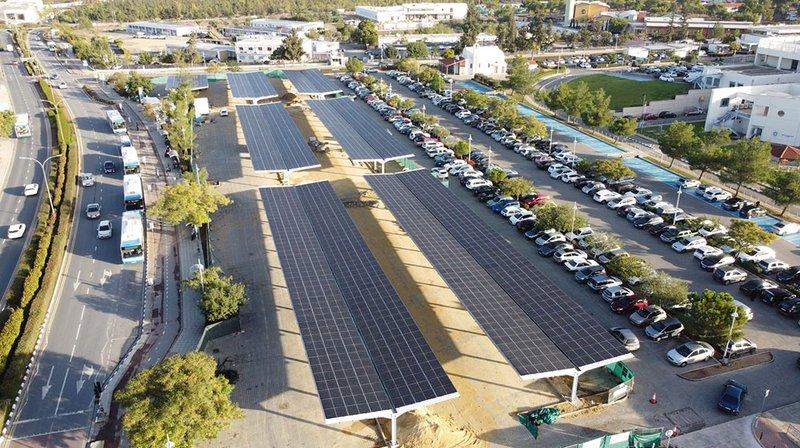On Friday, December 29, the Public Health Organization (OKYPY) announced that the first phase of the construction of a photovoltaic park for the needs of Nicosia General Hospital is coming to an end.
Specifically, the works are to be completed on January 7, 2024. At the same time, the second phase of the large-scale project, according to the agency, will start in March 2024.
Note that the solar power plant is being installed in the parking lot of the hospital. According to the idea, photovoltaic panels will convert solar energy into electricity. Moreover, the panels are placed in such a way as to ensure shading of parked vehicles. The capacity of the park will be 1.3 MW. It will generate about 60 MWh of energy per year and will be able to fully cover the needs of the medical center.
The ultimate goal of the project is to meet the energy needs of the hospital. The project budget is estimated at €1.8 million + VAT. The construction costs of the photovoltaic park were covered by OKYPY. Once the project is commissioned, the contracting company Trikkis Energy Ltd will be responsible for its maintenance for 24 months.

Several technologies are used in the world to convert solar heat and light into electricity. The most popular ones are:
- Photovoltaic (PV) devices such as solar panels, which directly convert sunlight into electricity using semiconductors.
- Concentrating solar power plants (CSP), which use mirrors to direct sunlight to a central point that generates enough heat to fuel steam turbines or engines to generate electricity.
- Solar Heating and Cooling (SHC) systems that use thermal heat from the sun to heat water and cool the air, replacing the need for electricity or natural gas.
Since Cyprus has almost 365 days of sunshine a year, the problem of economical electricity consumption is mainly solved by building photovoltaic parks. Unlike burning coal, solar energy does not cause the greenhouse effect that exacerbates global warming. In addition, solar energy can play an important and cost-effective role in overcoming Cyprus' dependence on fossil fuels.
Improved ways of storing solar energy can also increase the sustainability of the energy system. By storing extra energy on sunny days, batteries ensure that power is available in cloudier weather or when cyclones knock out traditional power lines. As a result, consumers in Cyprus can get more reliable energy at a lower cost. By the way, these ambitious investments are not just good climate policy, but a great chance for Cyprus to invest in itself and its future.
